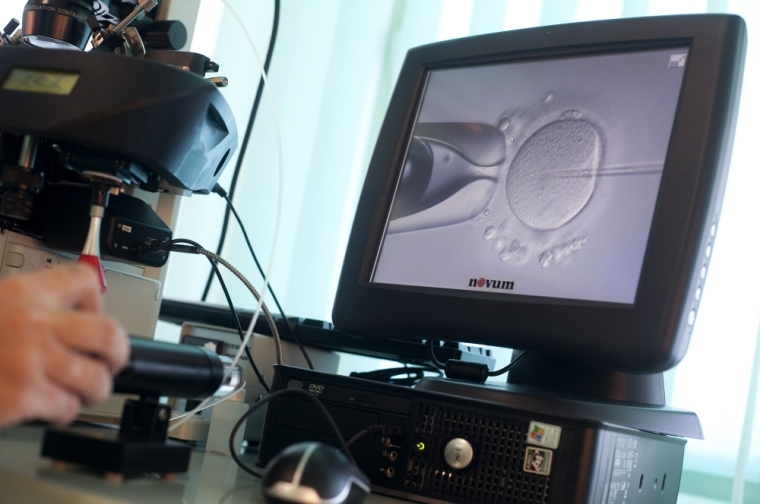

A Virginia judge cited a 19th-century regulation about slave ownership in ruling that human embryos can lawfully be deemed residence or “chattel.”
Fairfax County Circuit Court Decide Richard Gardiner issued the preliminary viewpoint last month in a circumstance involving a divorced couple’s dispute over embryos they saved alongside one another. The pair, Honeyhline Heidemann and Jason Heidemann, separated in 2017 and divorced in 2018.
The ex-spouse is 45 and infertile because of to most cancers treatments and wishes to use the embryos, even though her ex-partner does not.
Jason Heidemann’s legal professionals argued that if his ex-wife have been to use the embryos, this “would drive Mr. Heidemann to procreate towards his needs and thus violate his constitutional suitable to procreational autonomy.”
The choose to begin with sided with the husband and established that a pre-Civil War regulation centered on “merchandise or chattels” that concerned custody disputes above slaves used to the couple’s scenario. However, the judge’s ruling is not final as he has however to rule on other arguments in the situation.
“As there is no prohibition on the sale of human embryos, they may perhaps be valued and marketed, and so could be deemed items or chattels,” Gardiner wrote.
As The Involved Press noted, Honeyhline Heidemann’s law firm, Adam Kronfeld, asked the choose to rethink. The attorney argued that his consumer has no other organic possibilities to conceive a youngster, and the spouse would not be beneath any lawful obligations to mum or dad.
Kronfeld mentioned that the few signed an arrangement in 2018, which presently explained the embryos as house and mentioned they would continue to be in storage right until a courtroom ordered normally, in accordance to AP.
Jennifer Lahl, founder and president of the Center for Bioethics and Lifestyle, pointed to the National Embryo Donation Centre, which studies that roughly 1 million are frozen in storage in the United States. She observed that “the regulation and our courts have not settled the subject of what a frozen embryo is.”
“Is it a individual, afforded legal rights, or is it assets, resolved using agreement legislation?” Lahl asked in a Tuesday assertion to The Christian Publish.
She cited Jeter v. Mayo Clinic Arizona, a 2005 situation involving the Jeter few who had undergone in vitro fertilization and experienced their embryos cryopreserved and stored at a clinic. The Jeters alleged that the clinic’s carelessness resulted in the destruction of those embryos, like a declare for the restoration for the decline of “irreplaceable home” in their complaint.
As Lahl noted, the case deemed that embryos have been “not assets” but mentioned that they need to be afforded “various levels of distinctive regard dependent on the issues included.”
“What would be the ‘special respect’ owed to the embryo, and who would come to a decision what that is?” she asked. “This is just another case in point of where by reproductive technologies have moved forward with no any serious ethical or lawful reflection.”
The Heidemanns’ IVF agreement from 2015 did not handle what need to come about to the saved embryos in the event that one mum or dad died or the pair divorced, in accordance to the impression letter. Though the Heidemenns conceived a daughter through IVF, two embryos from the IVF remedy continue being cryopreserved.
Prior to the pair divorced in November 2018, they executed a Voluntary Separation and Home Settlement Settlement, and under the subheading “Division of Personalized Assets,” the Heidemenns acknowledged the frozen embryos belonged to equally of them. Pending a courtroom order and long term disposition, equally get-togethers agreed that neither would eliminate the embryos from storage and would break up the expense of storage.
In April 2019, Honeyhline Heidemann asked for her ex-husband’s consent to employ the embryos to conceive a boy or girl, but neither party could arrive at an agreement. In July 2019, she re-opened the divorce case and filed a Motion to Figure out Disposition of Cryopreserved Human Embryos, which was dismissed in Might 2020.
She opened a new case in November 2021, requesting that the courtroom award her sole custody of the embryos or “partition the two embryos in variety,” but her ex-husband demurred.
Samantha Kamman is a reporter for The Christian Submit. She can be reached at: [email protected]. Follower her on Twitter: @Samantha_Kamman
No cost Spiritual Flexibility Updates
Sign up for thousands of many others to get the Freedom Article newsletter for free of charge, sent two times a week from The Christian Article.





